This page contains a variety of audio clips, videos, newspaper articles, journal articles and more that offer a variety of perspectives on Bill C-7, explain what the effect of assisted suicide has been in other countries in the world, and advocacy work done by people with disabilities.
Click a button below to navigate to that section.
Articles
https://www.nationalmagazine.ca/en-ca/articles/law/opinion/2021/hearing-everyone-on-maid
https://www.convivium.ca/articles/progress-against-maid/#.X7gDzOBoSY8.twitter
https://lfpress.com/opinion/columnists/coelho-gandhi-and-herx-lack-of-support-vs-option-to-die
https://www.wma.net/wp-content/uploads/2020/05/newwmj_2_2020_WEB.pdf
https://nationalpost.com/opinion/opinion-proposed-changes-to-maid-are-pure-madness
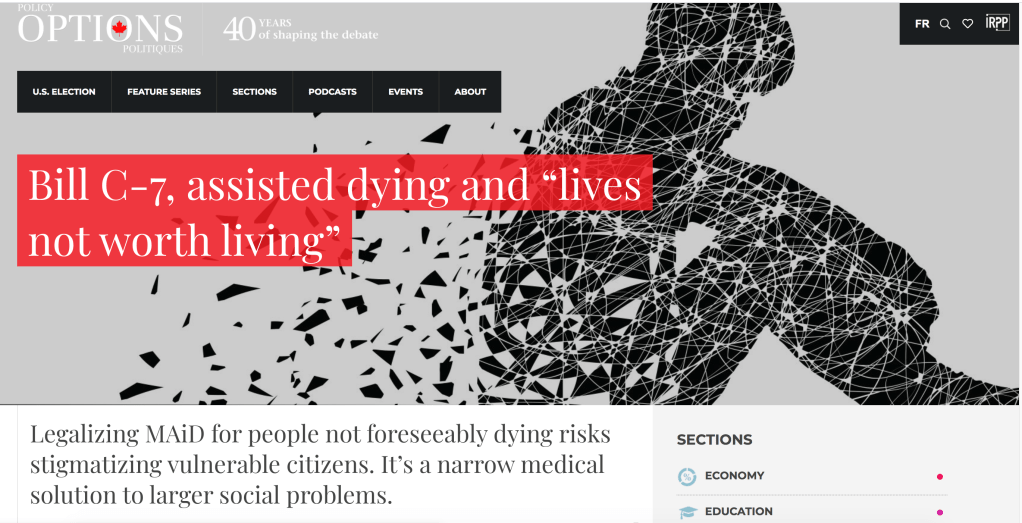
Legalizing MAiD for people not foreseeably dying risks stigmatizing vulnerable citizens. It’s a narrow medical solution to larger social problems.
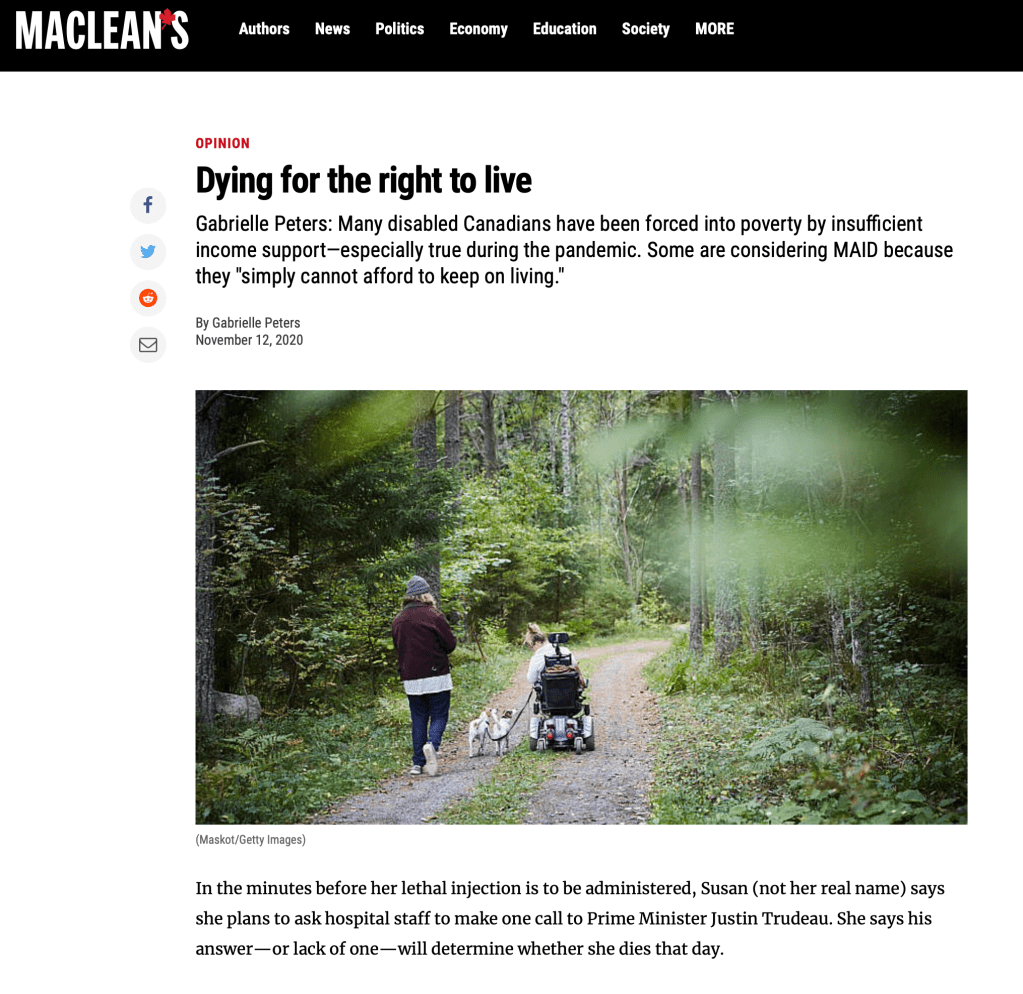
“Dying for the right to live. Gabrielle Peters: Many disabled Canadians have been forced into poverty by insufficient income support—especially true during the pandemic. Some are considering MAID because they “simply cannot afford to keep on living.”” Maclean’s
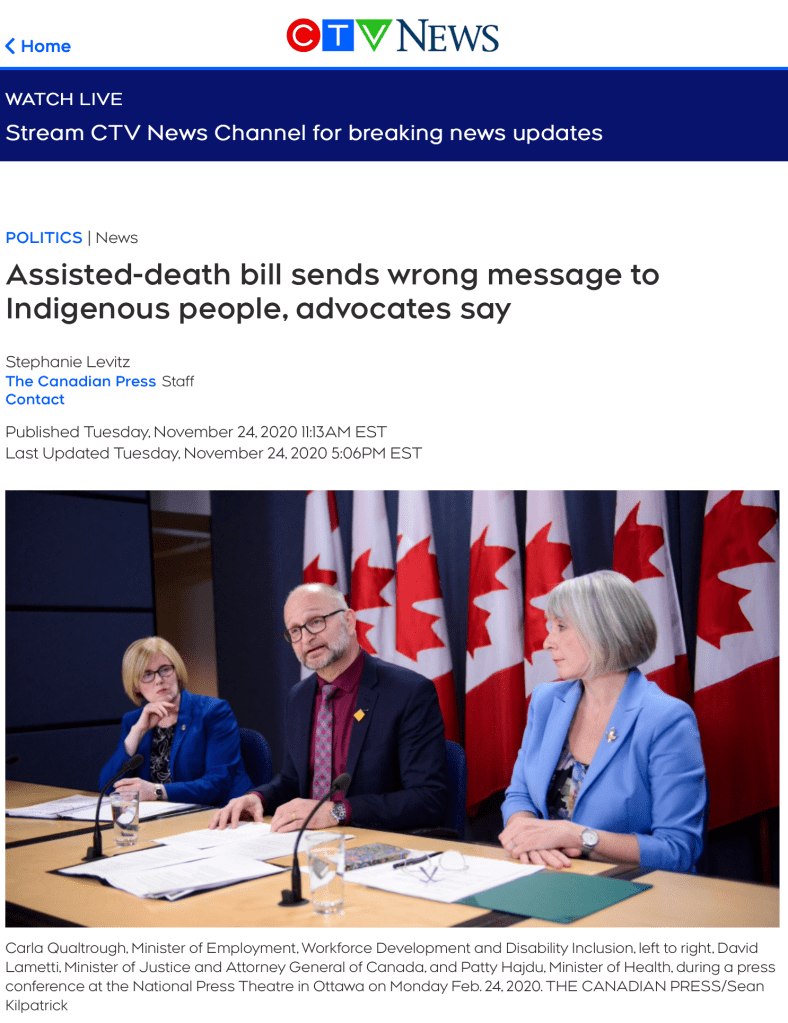
“Assisted-death bill sends wrong message to Indigenous people, advocates say” CTV News

“‘We need a public outcry’: B.C. father with ALS ends life after struggle to stay at home” CTV News
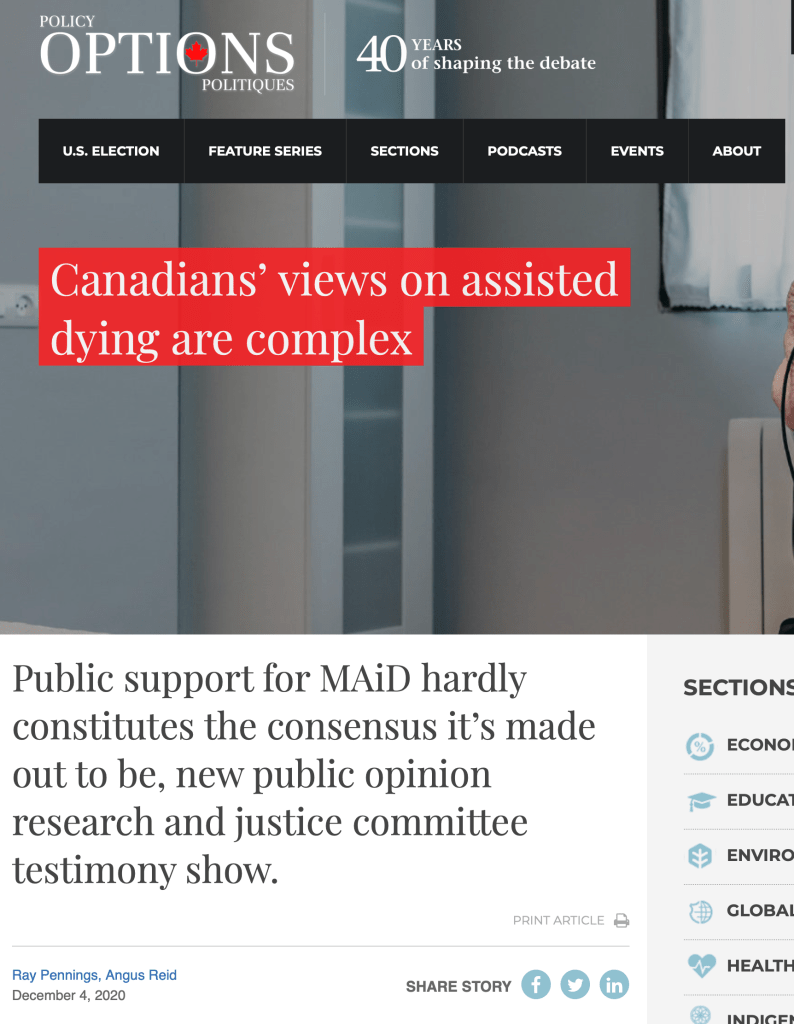
“Canadians’ views on assisted dying are complex. Public support for MAiD hardly constitutes the consensus it’s made out to be, new public opinion research and justice committee testimony show.” Policy Options
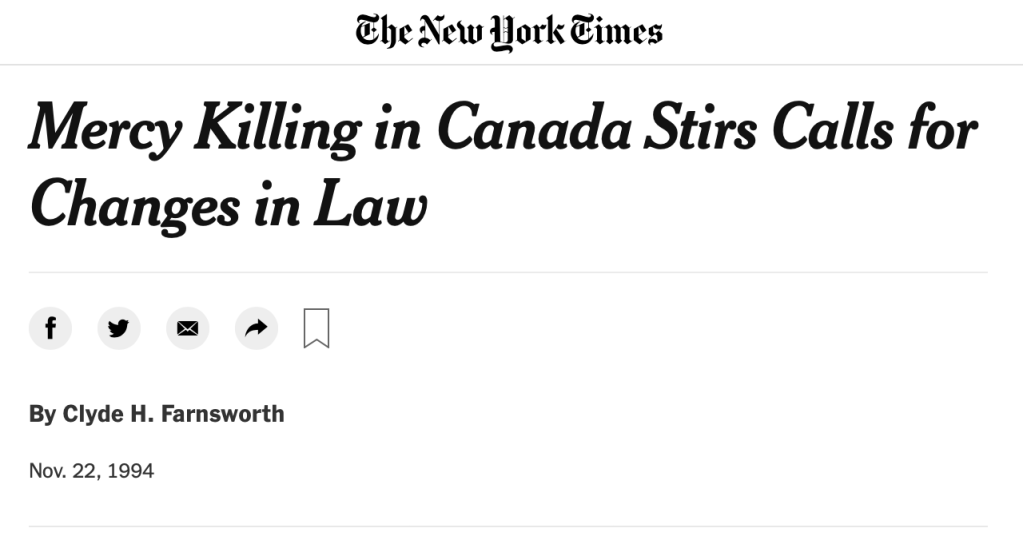
“Mercy Killing in Canada Stirs Calls for Changes in Law” New York Times
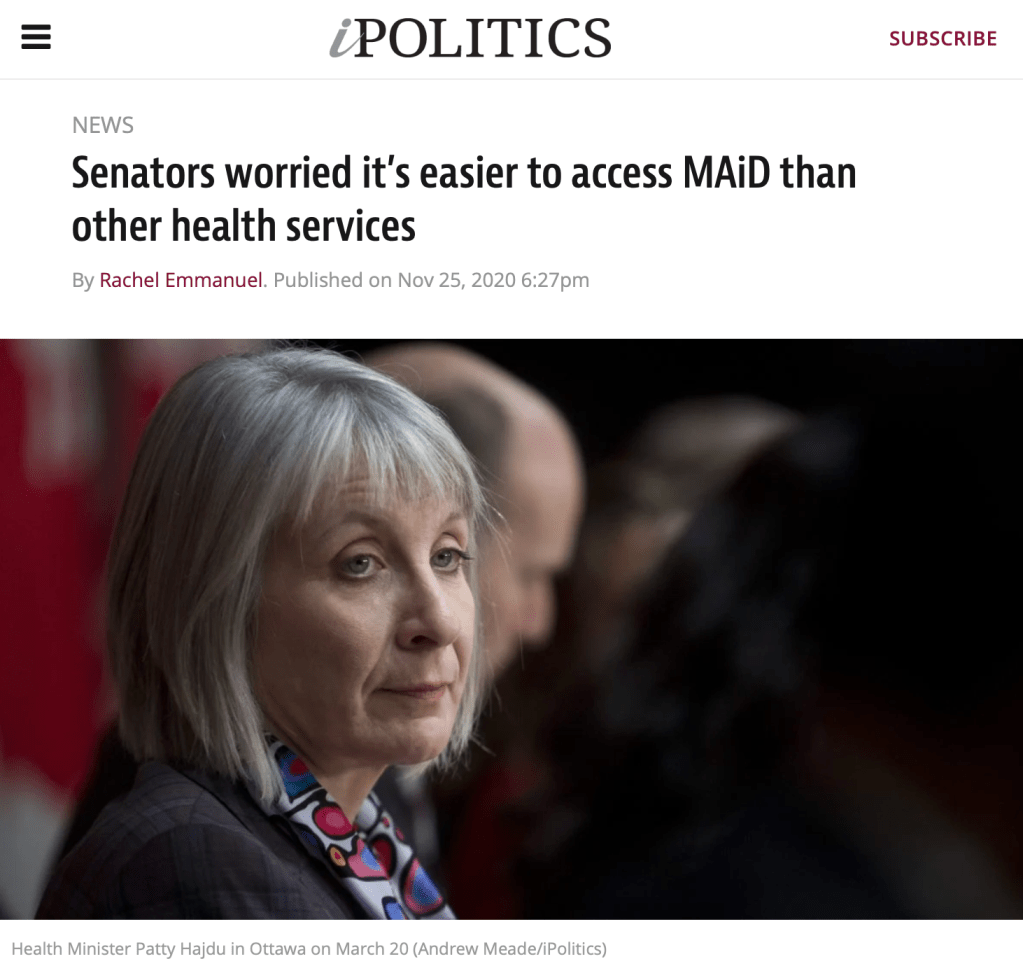
“Senators worried it’s easier to access MAiD than other health services” iPolitics

“Bill C-7 Shatters Illusions Regarding Canada’s Commitments to Persons with Disabilities” National Newswatch
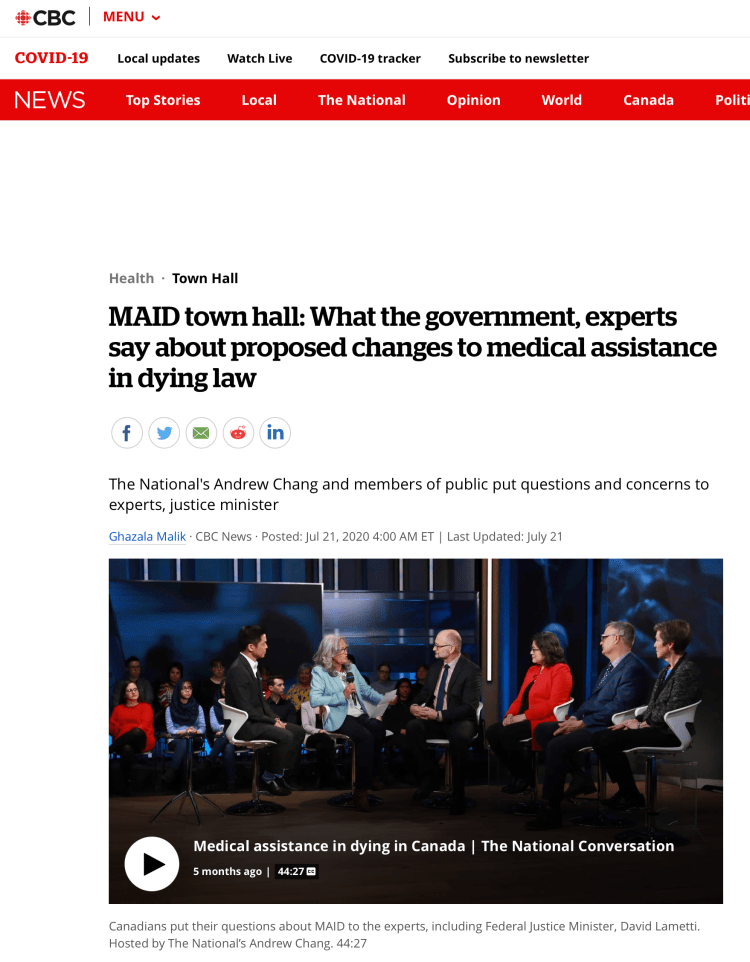
“MAID town hall: What the government, experts say about proposed changes to medical assistance in dying law” CBC News
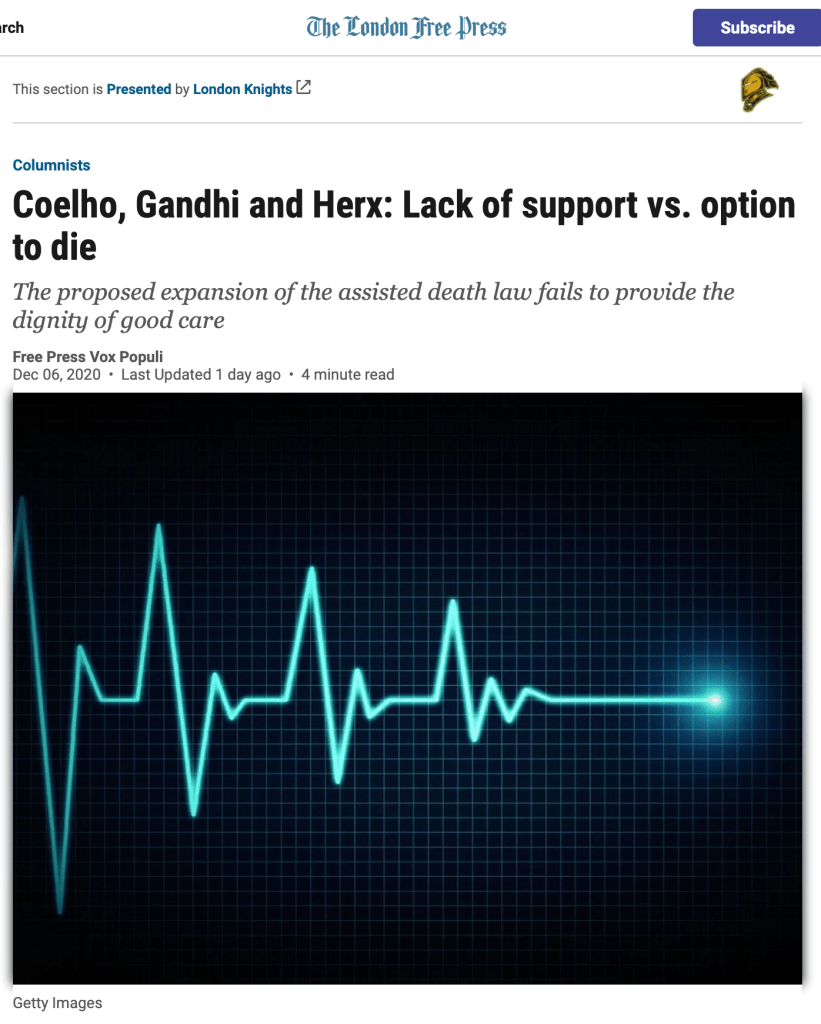
“Coelho, Gandhi and Herx: Lack of support vs. option to die – The proposed expansion of the assisted death law fails to provide the dignity of good care.” London Free Press

“One in 10 Canadians say they’ve contemplated suicide since the pandemic began” Toronto Star
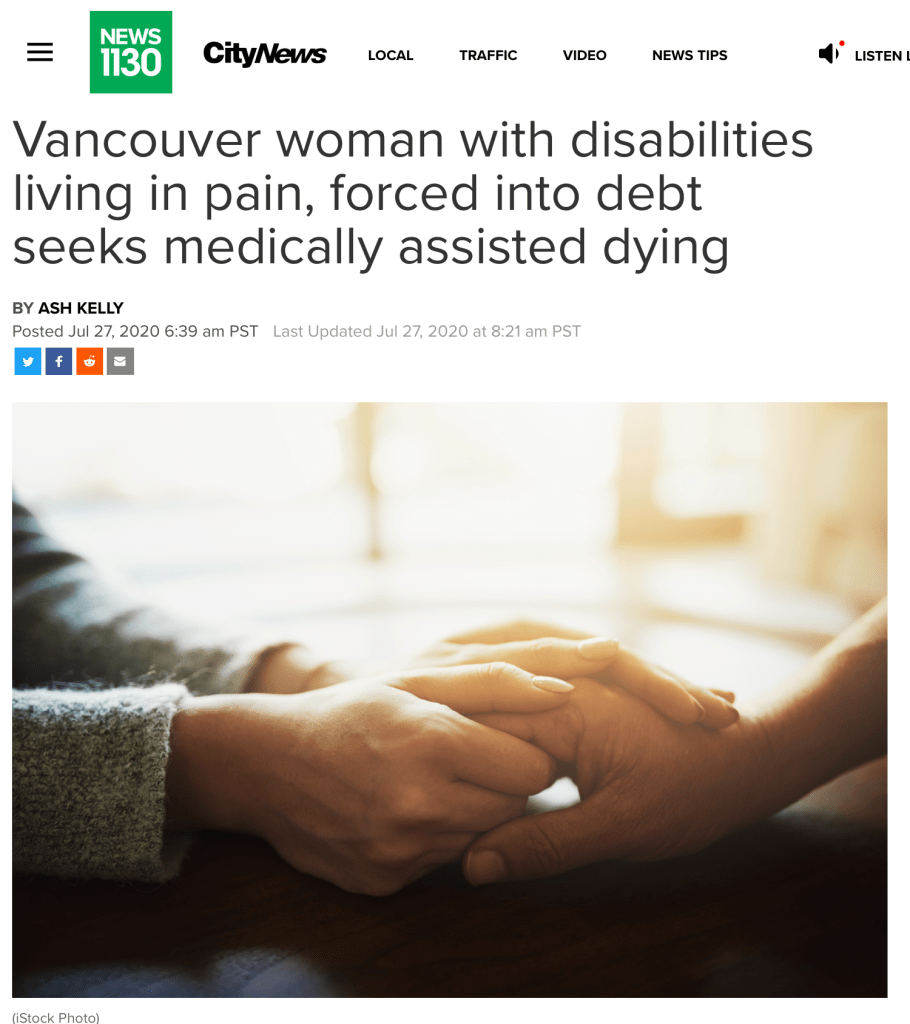
“Vancouver woman with disabilities living in pain, forced into debt seeks medically assisted dying” News1130
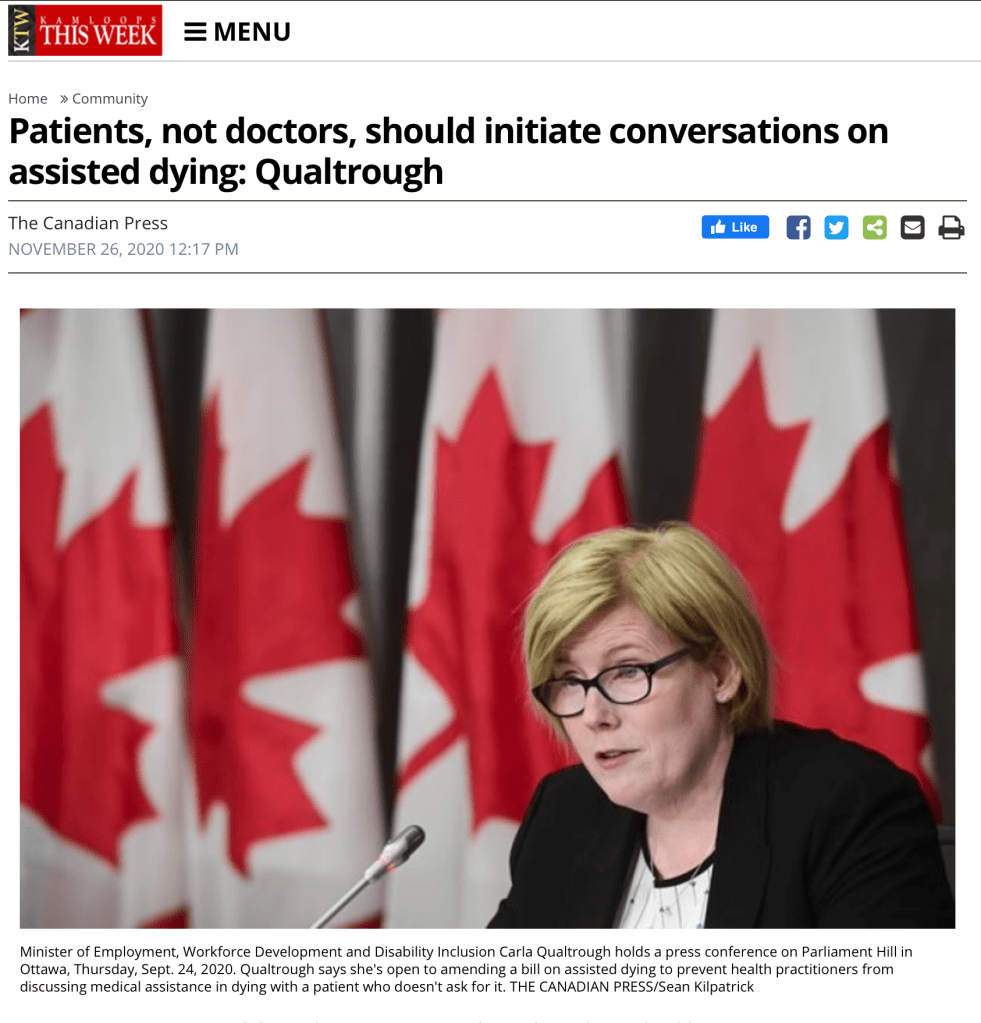
“Patients, not doctors, should initiate conversations on assisted dying: Qualtrough” Kamloops This Week
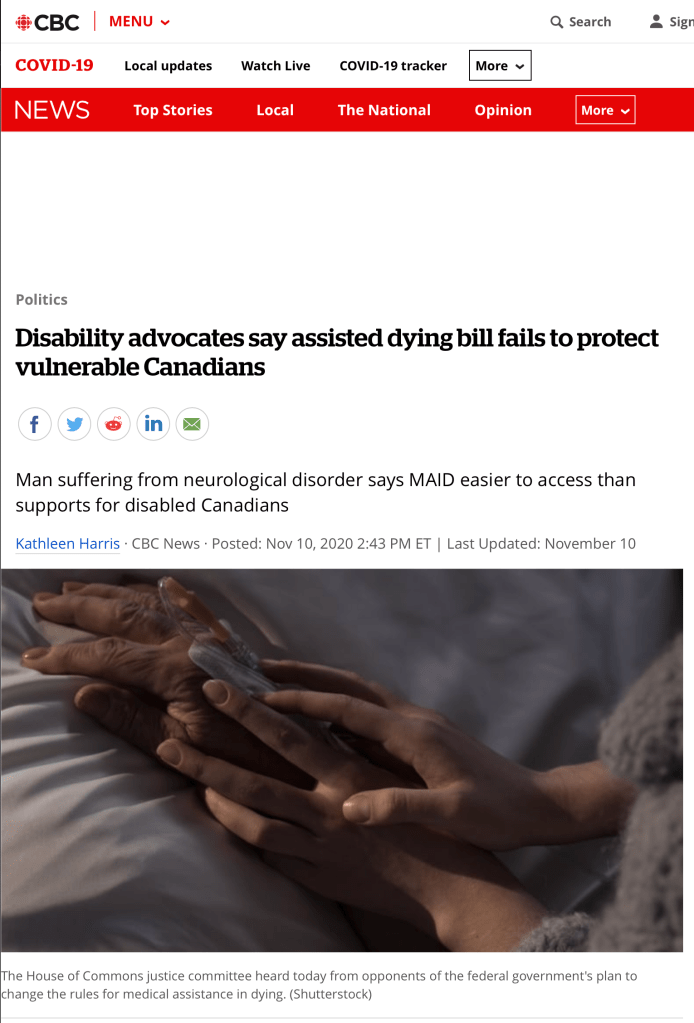
“Disability advocates say assisted dying bill fails to protect vulnerable Canadians. Man suffering from neurological disorder says MAID easier to access than supports for disabled Canadians” CBC News
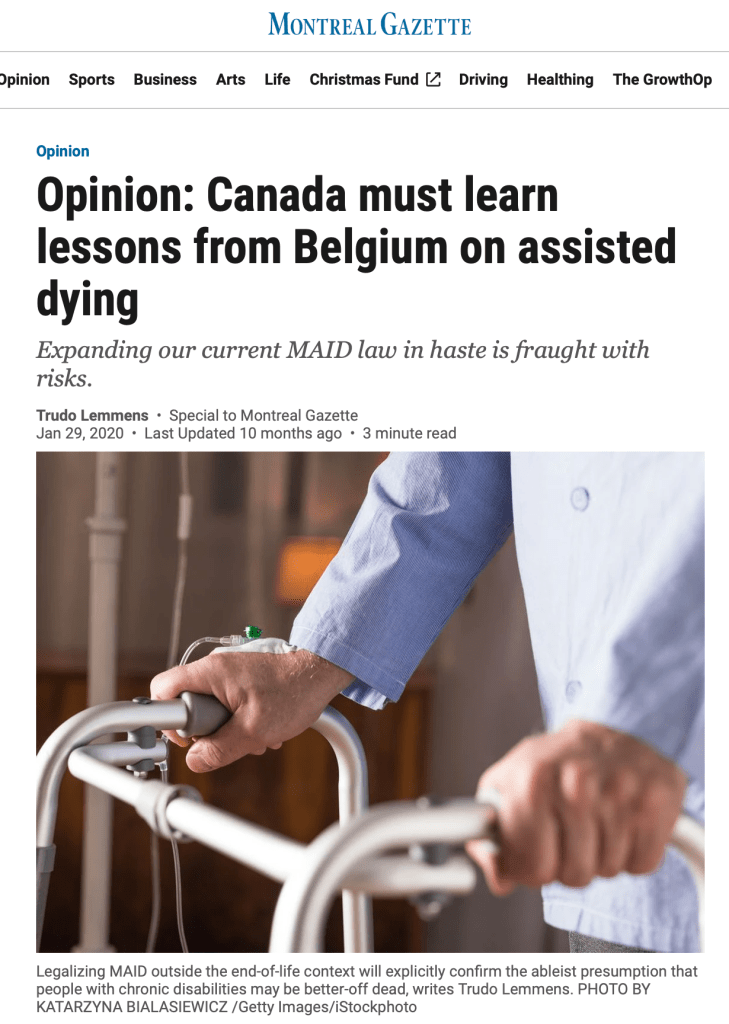
“Opinion: Canada must learn lessons from Belgium on assisted dying” Montreal Gazette
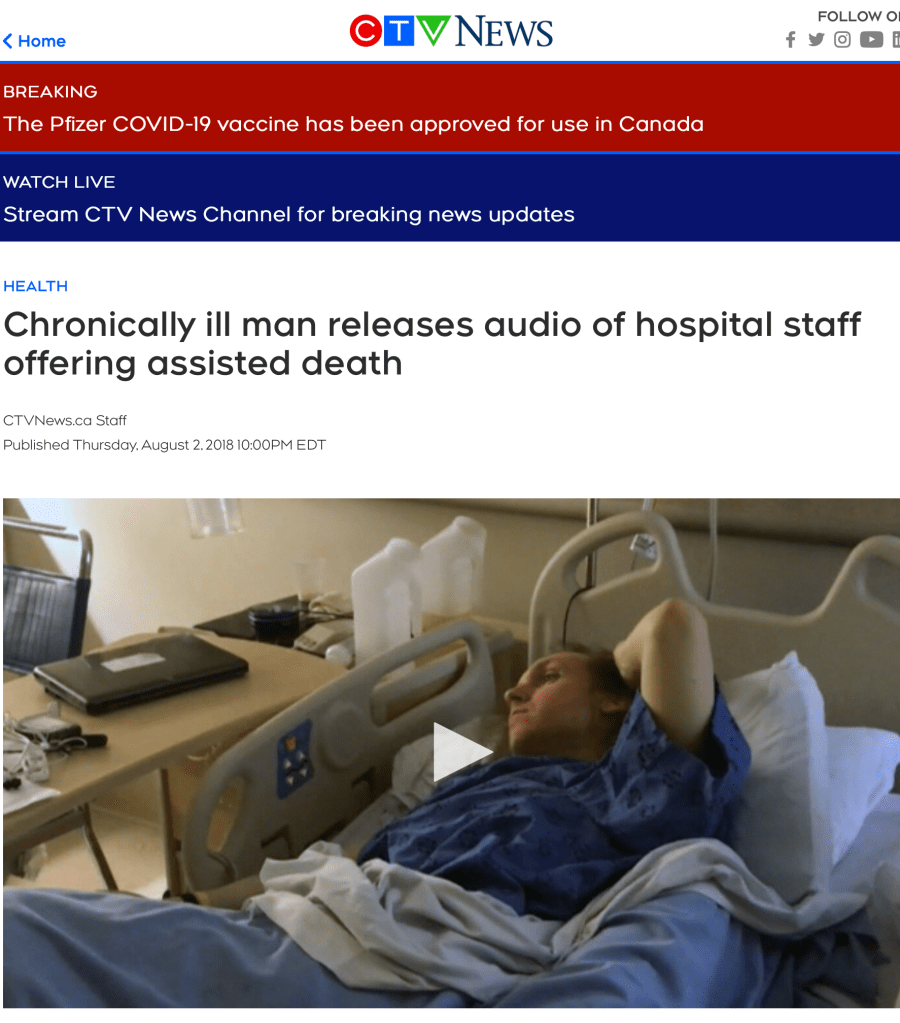
“Chronically ill man releases audio of hospital staff offering assisted death” CTV News
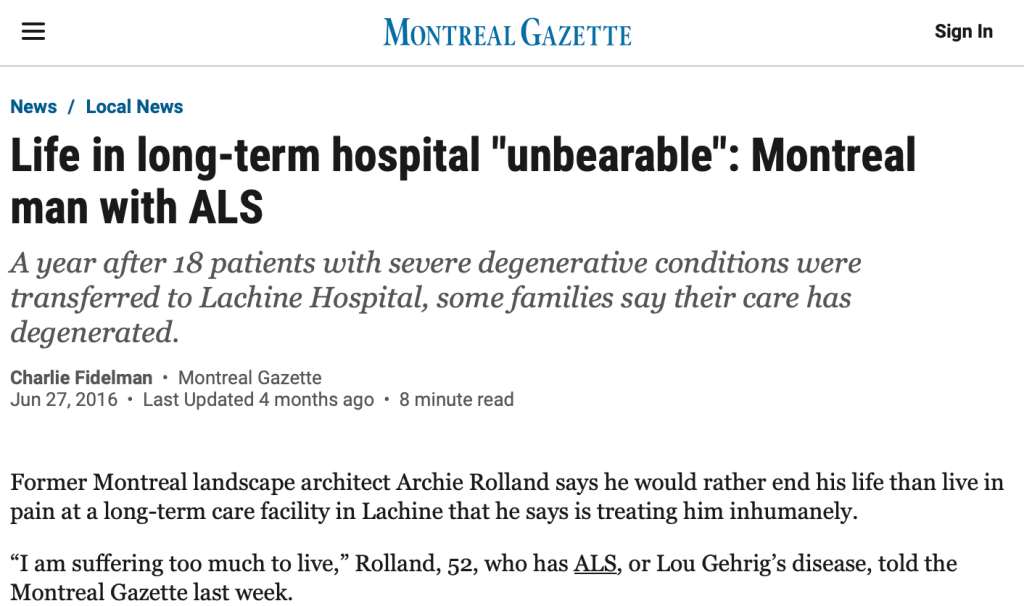
“Life in long-term hospital “unbearable”: Montreal man with ALS. A year after 18 patients with severe degenerative conditions were transferred to Lachine Hospital, some families say their care has degenerated.” Montreal Gazette
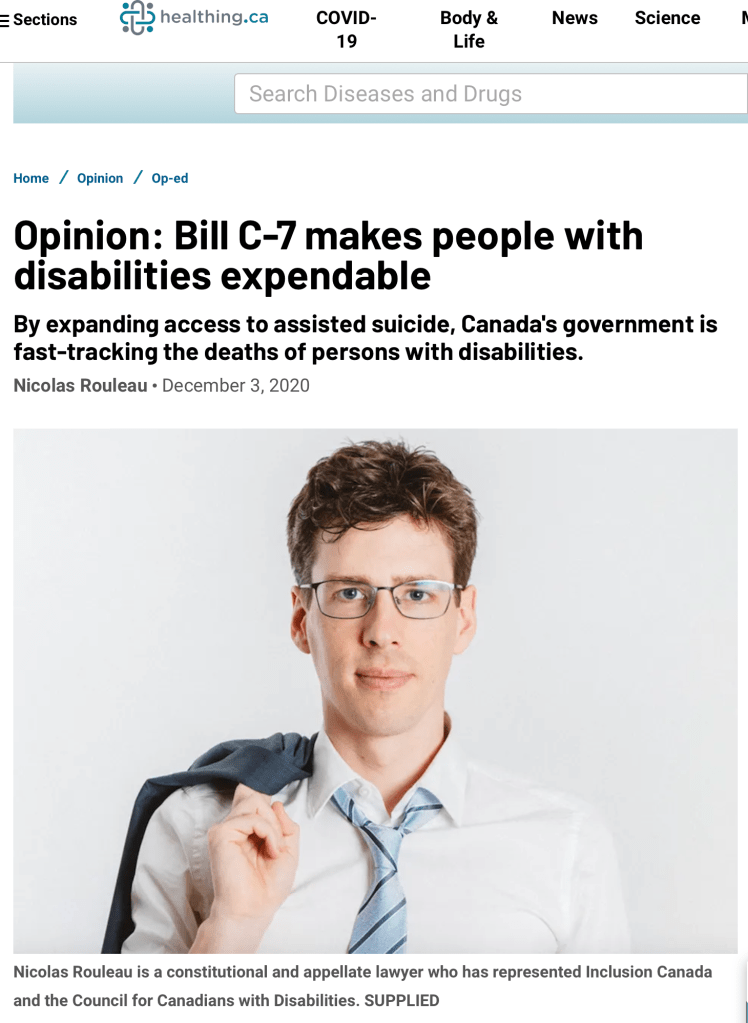
“Opinion: Bill C-7 makes people with disabilities expendable. By expanding access to assisted suicide, Canada’s government is fast-tracking the deaths of persons with disabilities.” Healthing.ca

“ODSP recipients calling for help, exploring assisted dying” Toronto CityNews
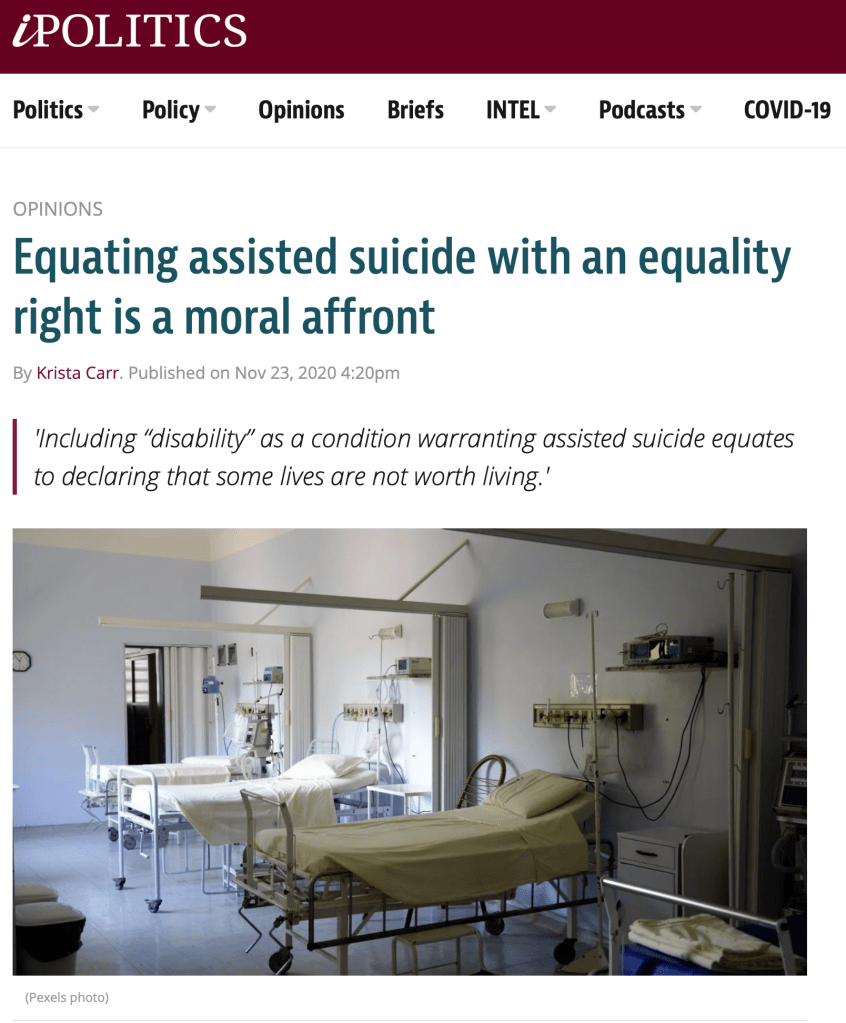
“Equating assisted suicide with an equality right is a moral affront” iPolitics

Researchers say Canadians with disabilities are rationing drugs due to high prescription costs
For people with disabilities, prescription drug costs are often layered on top of other health-related costs
Studies
Watch Trudo Lemmens (Professor and School Chair in Health Law and Policy, Faculty of Law Joint Centre for Bioethics and Dalla Lana School of Public Health, University of Toronto) discuss critical reflections on Bill C-7. University of Toronto Joint Centre for Bioethics Seminar, “When Medical Assistance in Dying becomes a Terminal Therapy for Suffering in Life: Critical Reflections on Canada’s new MAiD Bill”
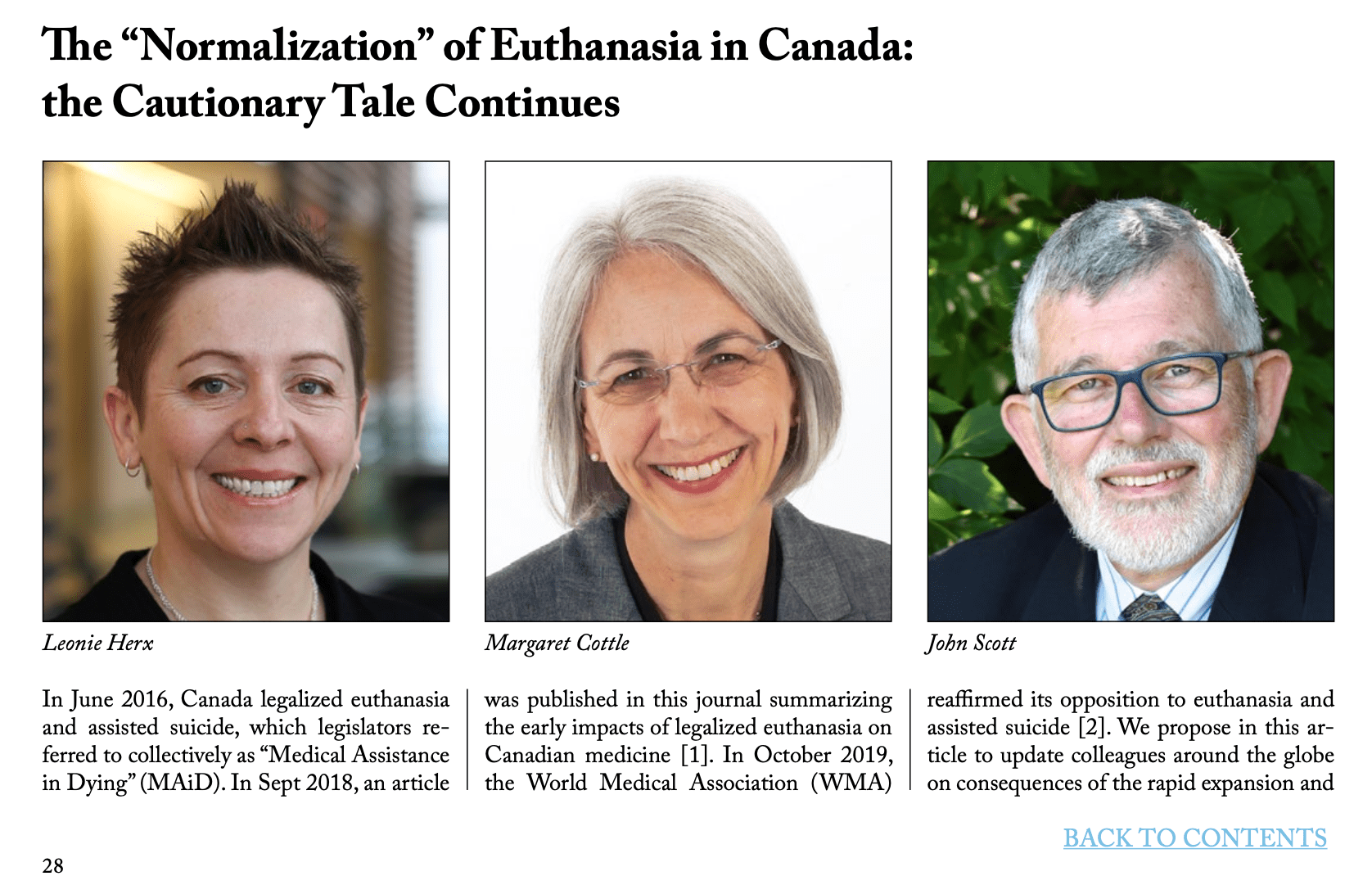
“The “Normalization” of Euthanasia in Canada: the Cautionary Tale Continues” published in World Medical Journal
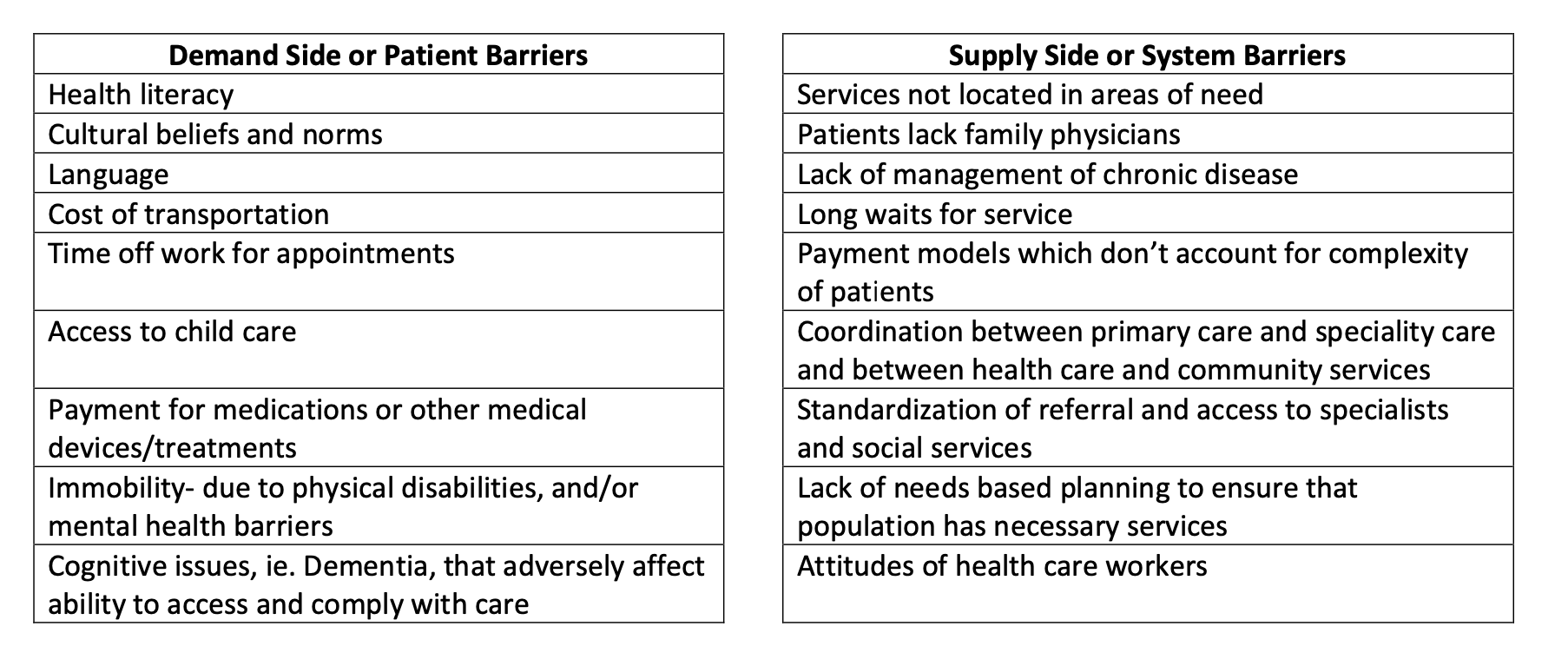
“There is far ranging evidence indicating that access to care is not equitable in Canada. Those with higher socio-economic status have increased access for almost every health service available, despite having a generally higher health status and therefore a decreased need for health care. This includes insured services (such as surgery), as well as un-insured services such as pharmaceuticals and longterm care. Those from disadvantaged groups are less likely to receive appropriate health care even if access to the system is available. They are more likely to report trouble getting appointments, less testing and monitoring of chronic health conditions, and more hospitalizations for conditions that could be avoided with appropriate primary care.” Canadian Medical Association

“Social determinants and inequities in health for Black Canadians: A Snapshot. The snapshot highlights how Anti-Black racism and systemic discrimination are key drivers of health inequalities faced by diverse Black Canadian communities.” by Government of Canada

“Suicidal Ideation Among Adults with Disability in Western Canada: A Brief Report” published in Community Mental Health Journal

“Medical Assistance in Dying: Challenges of Monitoring the Canadian Program” published in Canadian Journal of Bioethics
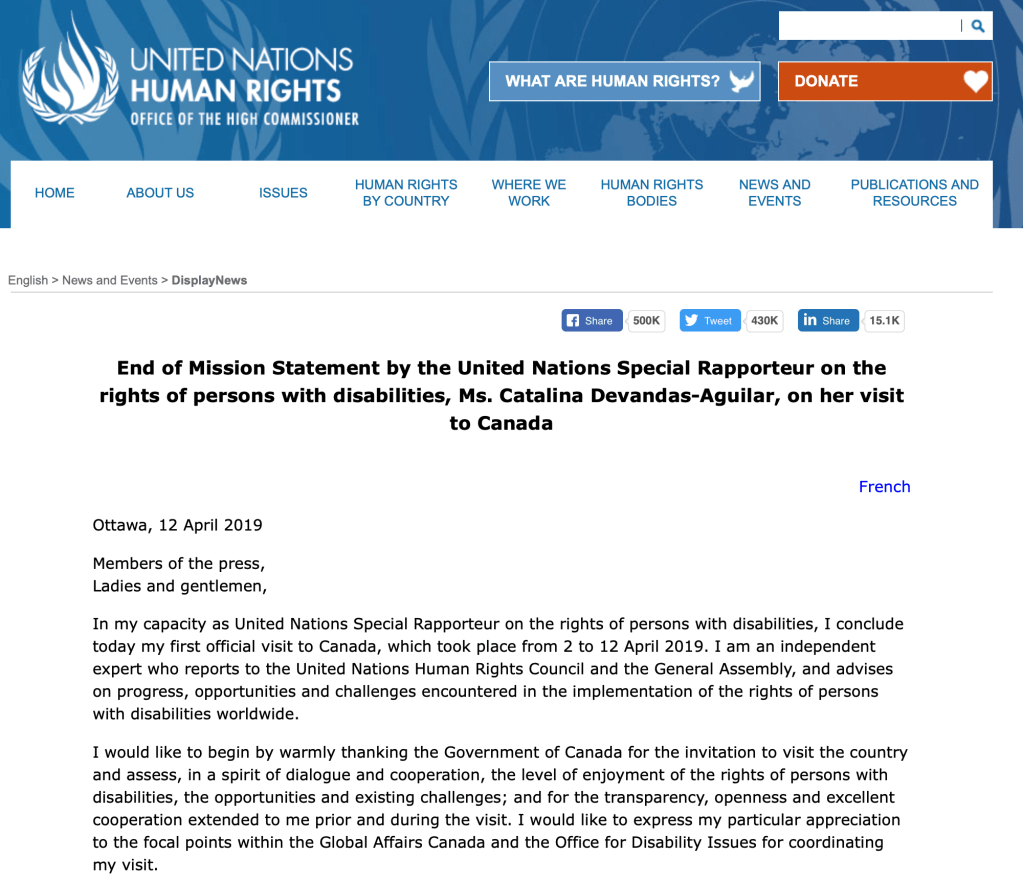
“I am extremely concerned about the implementation of the legislation on medical assistance in dying from a disability perspective. I have been informed that there is no protocol in place to demonstrate that persons with disabilities have been provided with viable alternatives when eligible for assistive dying. I have further received worrisome claims about persons with disabilities in institutions being pressured to seek medical assistance in dying, and practitioners not formally reporting cases involving persons with disabilities. I urge the federal government to investigate these complaints and put into place adequate safeguards to ensure that persons with disabilities do not request assistive dying simply because of the absence of community-based alternatives and palliative care.” United Nations Special Rapporteur on the rights of persons with disabilities
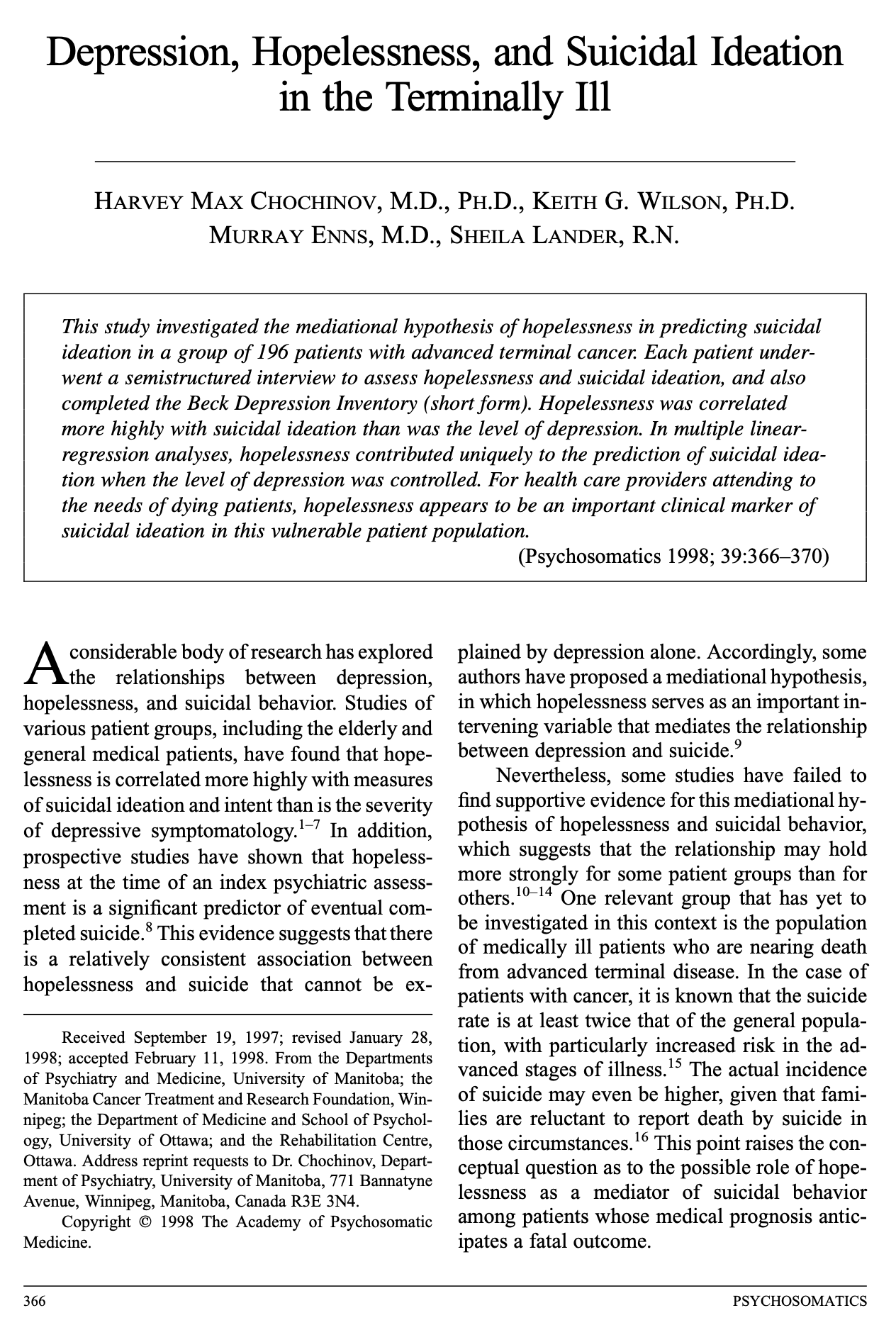
“Depression, Hopelessness, and Suicidal Ideation in the Terminally Ill” published in Journal of Psychosomatics
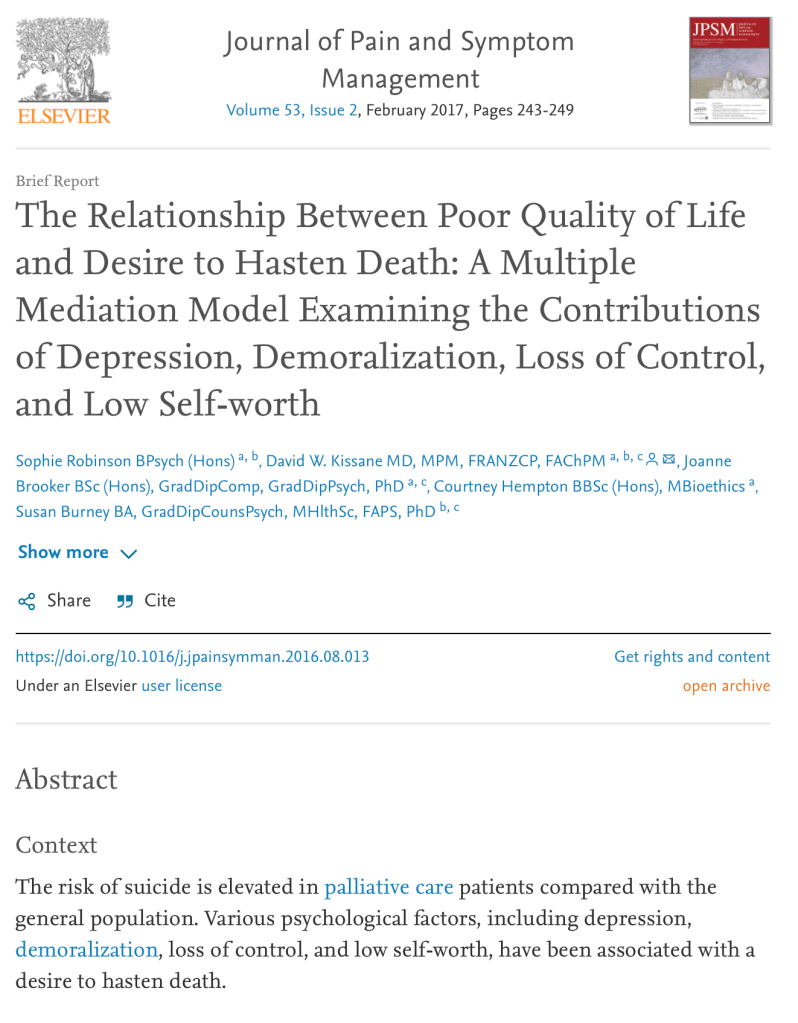
“The Relationship Between Poor Quality of Life and Desire to Hasten Death: A Multiple Mediation Model Examining the Contributions of Depression, Demoralization, Loss ofControl, and Low Self-worth” published in Journal of Pain and Symptom Management
Audio
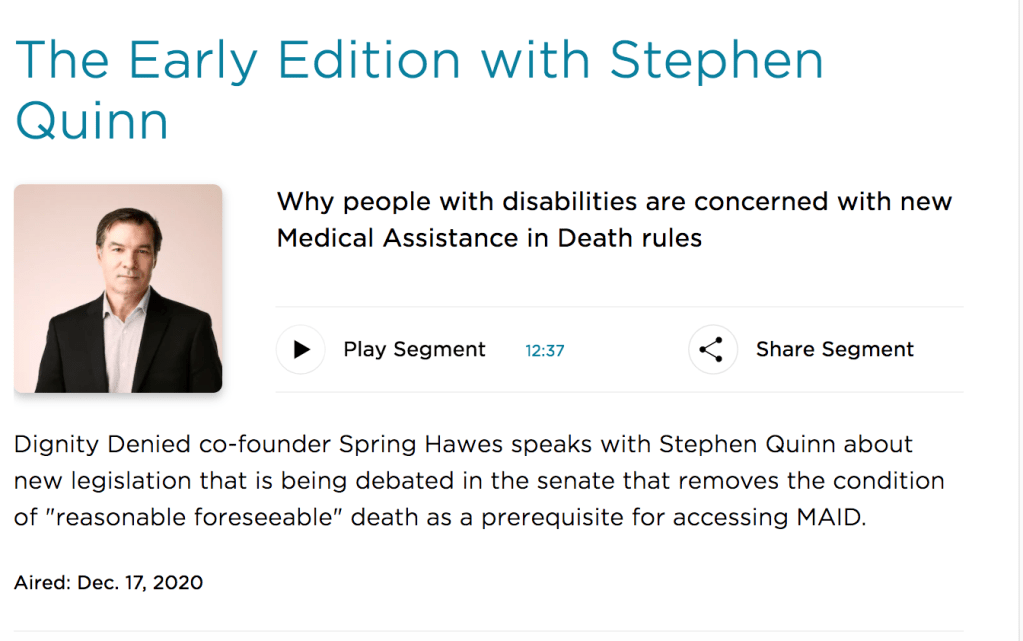
The Early Edition with Stephen Quinn: Why people with disabilities are concerned with new Medical Assistance in Death rules. Dignity Denied co-founder Spring Hawes speaks with Stephen Quinn about new legislation that is being debated in the senate that removes the condition of “reasonable foreseeable” death as a prerequisite for accessing MAID.
Season 4 of Canada Land “Pandemic” covers Résidence Herron in Dorval, Quebec, McKenzie Towne Continuing Care Centre in Alberta, and other long-term care facilities across Canada. Conditions have been described as “akin to a concentration camp.” Four months after the first outbreak in a Canadian nursing home, over 7000 long-term residents have died of COVID-19. You can find the audio and transcript for the first episode of twelve here. Episode 10 features Jonathan Marchand, one of the thousands of young disabled people living in long-term care. Listen or read the transcript for Episode 10 here.
Living Disabled
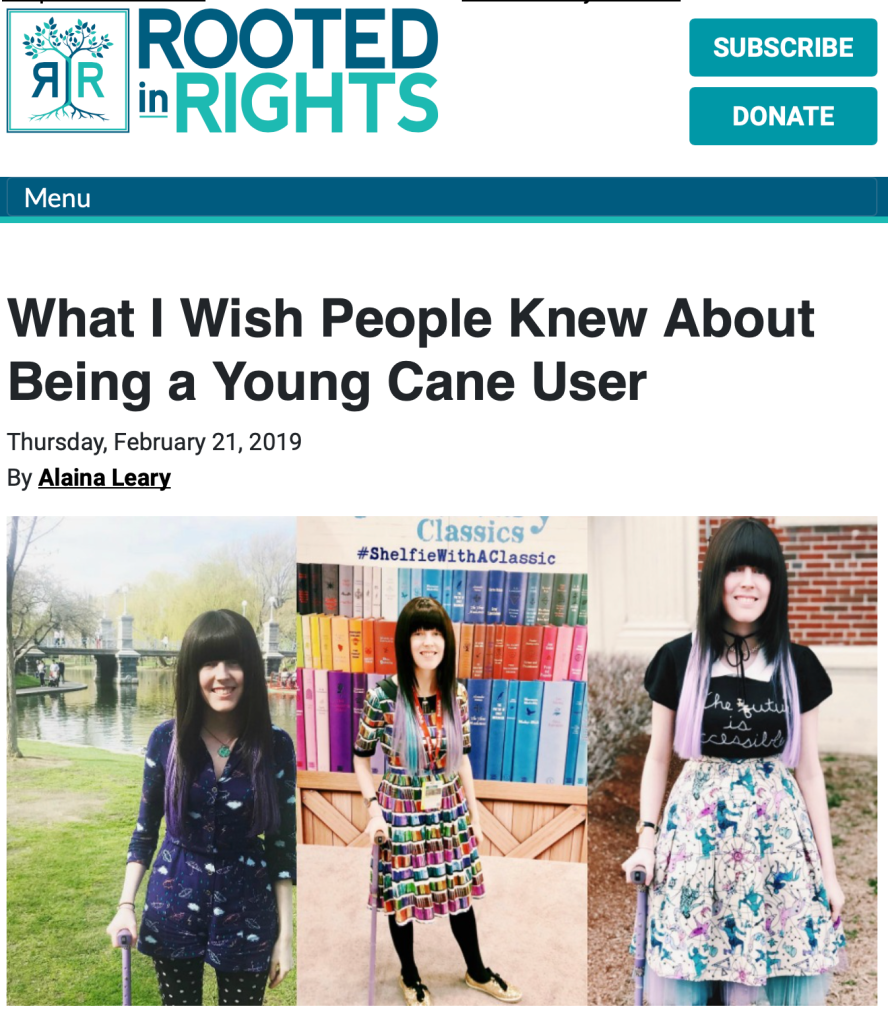
“What I wish people knew about being a young cane user” by Alaina Leary (Rooted in Rights)
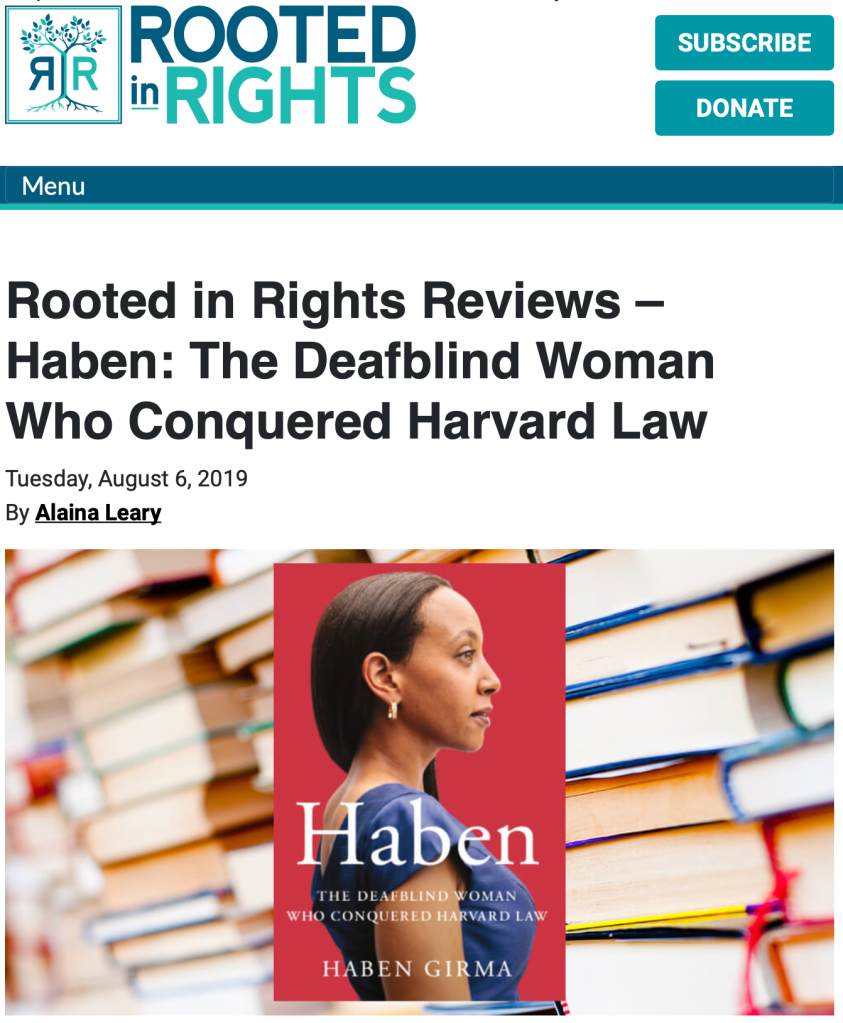
“Rooted in Rights Reviews – Haben: The Deafblind Woman Who Conquered Harvard Law” (Rooted in Rights)
In this video Patty Berne and Stacey Milbern present a social model of disability, explaining how universal design, adaptive devices, and meeting people’s access needs can limit the social, economic, and physical barriers that render physical impairments disabling in an ableist society. Milbern notes that focusing on individual impairments “lets society off the hook” for the structural oppression that renders some bodies and lives more valuable than others. Berne says “we are seen as disposable,” noting that the oppression that society ascribes to the individual body and disability is in fact a violent social construction.
On A Roll is a documentary about Greg Smith, “the wheelchair dude with attitude”, who runs a nationally syndicated radio show and is an activist and speaker. He has been profiled in major magazines and news programs, and is featured in a permanent Philadelphia exhibit on “33 Exceptional Americans.”
On the heels of Woodstock, a group of teen campers are inspired to join the fight for disability civil rights. Crip Camp is a film about the teens, their bonds, and their activism work in Berkeley California. The Crip Camp website has many great resources, including lesson plans for educators. Other notable films to watch are listed on the Disability Disability Project website.
When I Walk follows the life of filmmaker Jason DaSilva.
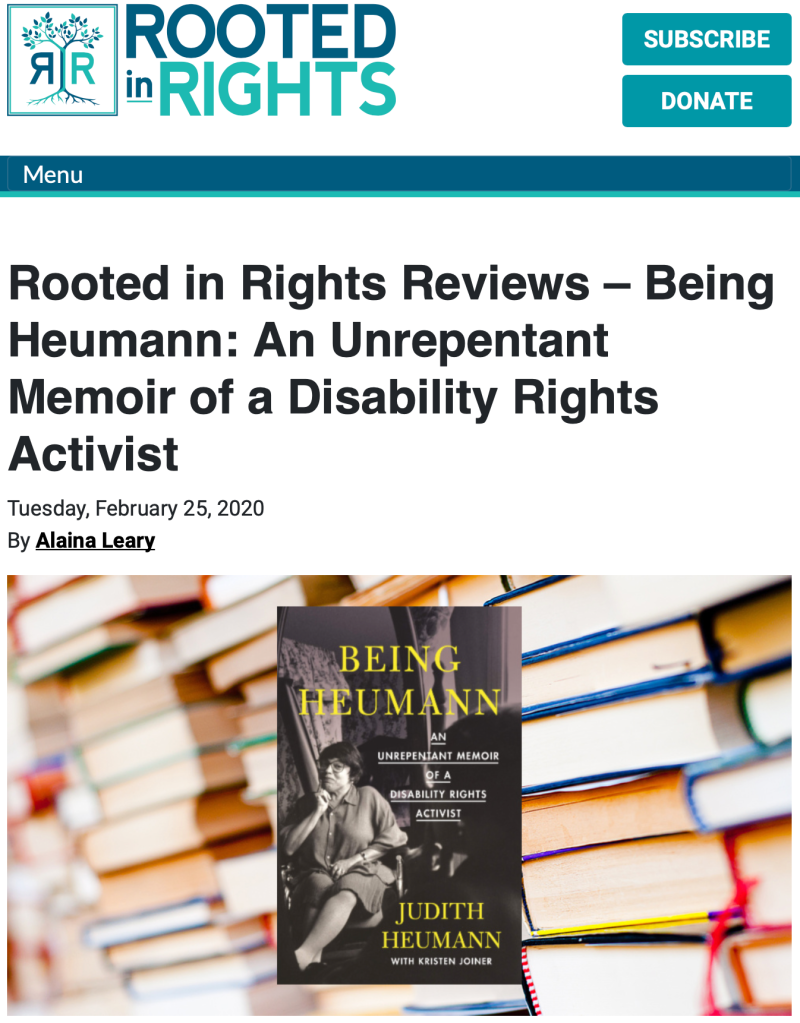
“Rooted in Rights Reviews – Being Heumann: An Unrepentant Memoir of a Disability Rights Activist” (Rooted in Rights)
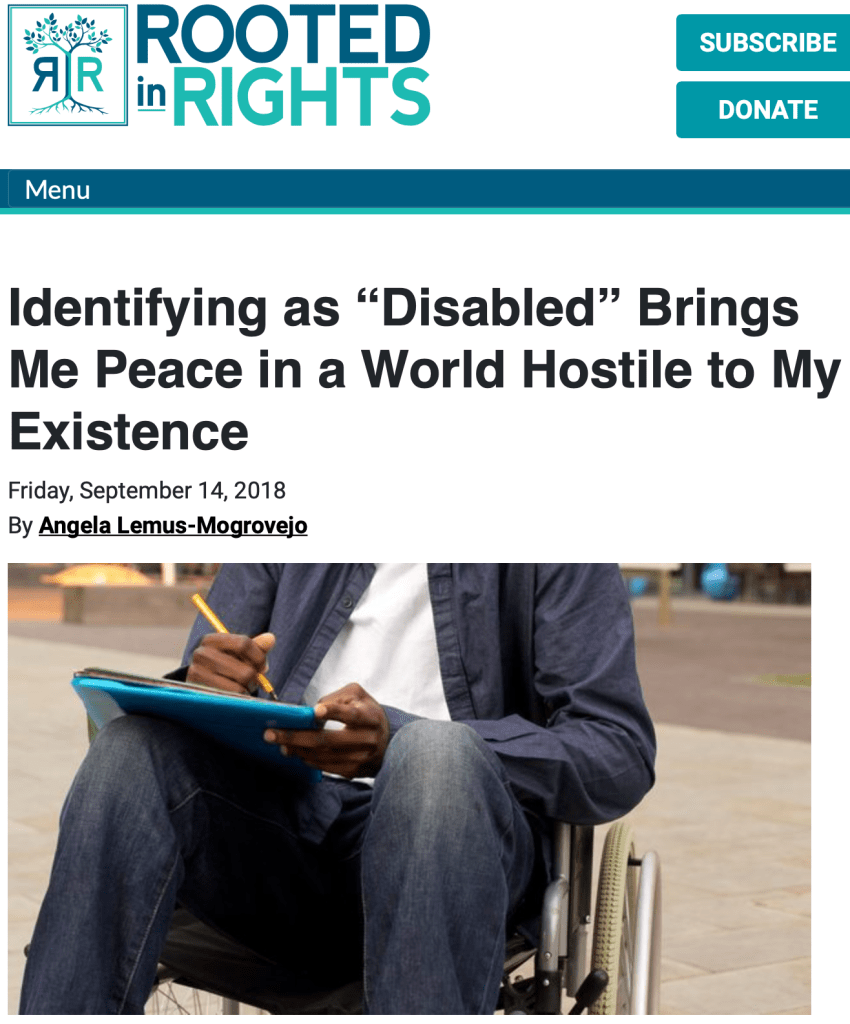
“Identifying as “Disabled” Brings Me Peace in a World Hostile to My Existence” by Angela Lemus-Mogrovejo (Rooted in Rights)
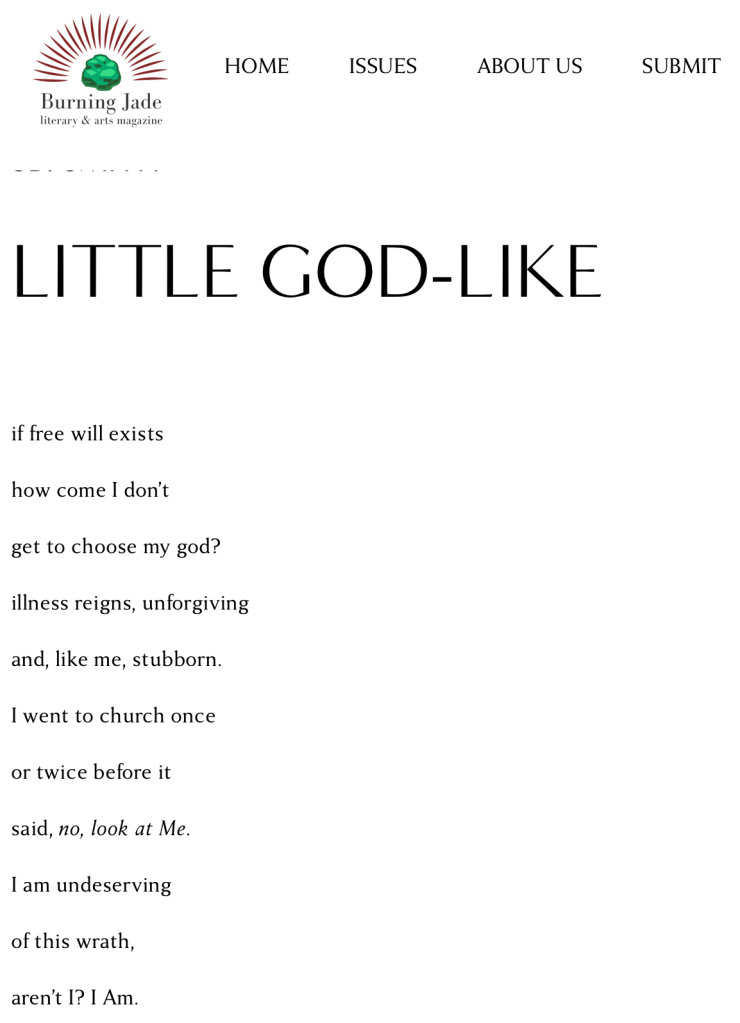
Poem entitled “Little God-Like” by sb. smith, published in Burning Jade. Read the full poem here.
The Freedom Tour (2008) is a powerful documentary that has been raising awareness about institutions both nationally and internationally. The film documents the incredible journey of 16 self-advocates and friends who travelled across the Prairie Provinces to raise awareness about life in an institution. The documentary portrays compelling stories told by survivors of institutions who had moved into communities across the Prairies. Produced in partnership with the National Film Board, The Freedom Tour is unique in that People First members were involved in all aspects of the film-making process – from development to the big screen.
Vision Portraits chronicles the creative paths of blind and visually impaired artists including John Dugdale (photographer), Kayla Hamilton (dancer), Ryan Knighton (writer) and the film’s director, Rodney Evans.
The Way of All Flesh tells the story of Henrietta Lacks, an African American woman from Baltimore who died of cervical cancer in 1951. Before she died some of her cancerous tissue was taken – without her permission – and the cells have been reproducing in laboratories around the world ever since. Henrietta Lacks’ cells, known as the HeLa cell line, continue to be used in medical and genetic research. Henrietta’s family did not learn of her “immortality” until more than twenty years after her death, when scientists investigating HeLa began using her husband and children in research without informed consent. And though the cells had launched a multimillion-dollar industry that sells human biological materials, her family never saw any of the profits. The Immortal Life of Henrietta Lacks by Rebecca Skloot tells the story of the Lacks family in the context of the dark history of experimentation on African Americans, the birth of bioethics, and the legal battles over our own bodies.